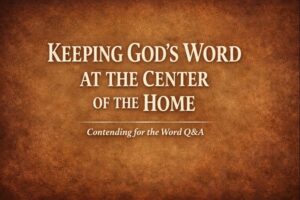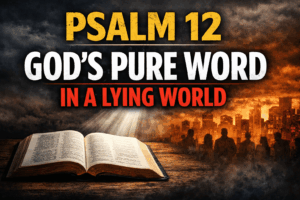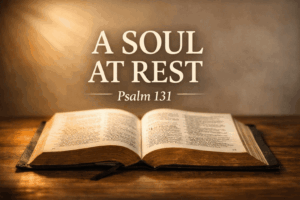⏱️ Estimated Reading Time: 6 min read
It was 1521. The Protestant Reformer Martin Luther was facing ecclesiastical trial four years after he had posted his Ninety-Five Theses on the church door in Wittenberg, Germany. Charles V, Holy Roman Emperor, was presiding.
“Are these your writings?”
Martin Luther stood still, his eyes fixed upon a large table which was covered with books. They were indeed his.
The next question thundered forth: “Do you recant?” But Martin Luther could not answer this question to the satisfaction of his hearers.
The reason? God had led Martin Luther to a conviction that had come to dominate all that he did, said, or wrote — a conviction that would become a watchword of the Protestant Reformation. This conviction came to be known as Sola Scriptura.
What is Sola Scriptura?
Emerging from the Protestant Reformation, Sola Scriptura is a Latin phrase meaning “scripture alone”. It refers to the conviction that the Bible is the sole source of authoritative revelation from God.
It is one of five such phrases (sola scriptura, solus Christus, sola fide, sola gratia, soli deo gloria) that together articulate the message of the reformers.
- Solus Christus: Christ is the Savior and sole Mediator of divine grace; we have no need for a human intermediary such as a priest to deal with God on our behalf.
- Sola Fide: Faith, not good works, is the means by which we receive the free grace of God.
- Sola Gratia: divine grace, not human achievement or merit, is the basis of the our salvation.
- Soli Deo Gloria: Because salvation is of God from start to finish, God alone receives the glory, and does not share it with angels, Mary, or the saints.
These phrases provide an overall approach to hermeneutics and theology that are still foundational for many today.
What did sola scriptura mean for the church then?
Sola Scriptura, or Scripture alone, implies that while human tradition and philosophy can be helpful, they possess a relative value and never carry divine authority. The Bible alone is God’s word.
This had immediate implications for Catholic tradition, otherwise known as the magisterium. Whereas Protestants recognize only one source of divine authority, the Bible, the Catholic Church regarded the Bible as one source of divine revelation alongside the magisterium, which is the accumulated body of church teaching derived from papal decrees, canon law, and ecclesiastical councils. It was seen as having an authority equal with Scripture. In theory, both were regarded as supreme. In practice, these often were in conflict with one another.
The developing conviction Sola Scriptura led Martin Luther and others to purge many Roman practices and beliefs such as the veneration of Mary and the doctrine of purgatory. These and other such practices and beliefs were not supported by Holy Scripture but rather by church tradition, and were abandoned.
On the other hand, anything in the Roman church seen as compatible with the teaching of Scripture was retained. This included orthodox doctrines like the Incarnation and the Trinity, early statements of faith such as the Apostles’ Creed, and the definitive statement of Christology set forth by the Council of Chalcedon.
Although Martin Luther’s writings were directed toward the aim of reforming the Roman Catholic Church, the reforms did not take root there. Instead, they were rejected by the papal authorities and Martin Luther himself was charged with heresy and excommunicated for his writings, leading to his appearance at the Diet of Worms in 1521.
When asked if he was willing to recant what he had written, the answer was no, because his writings were based upon Scripture alone. This led to Martin Luther’s famous words of resolve that still powerfully resound 500 years later: “Unless I am convinced by the testimony of the Scriptures or by clear reason…my conscience is captive to the word of God. I cannot and I will not retract anything, since it is neither safe nor right to go against conscience. Here I stand, I can do no other. God help me. Amen.”
What does Sola Scriptura mean for the church today?
Just as the Reformers took a fresh look at church doctrine and practice in the light of Sola Scriptura, so the church in every age must do the same. The church must be ecclesia reformata, semper reformanda (“the church reformed and always being reformed”).
Sola Scriptura implies that Scripture is the standard for judging all other truth claims. What beliefs or practices in our churches are incompatible with the clear teaching of Scripture? What values form the basis for our collective decision making? Are they biblical? Is the preaching Bible-saturated and God-glorifying? Does our polity betray our supposed high view of Scripture? Do we find ourselves rationalizing our way out of obedience to Christ’s command to lovingly discipline the erring believer or correct the false teacher (Matt. 18:15-20; 2 Thess 3:14-15; Titus 1:9)?
Sola Scriptura also implies the sufficiency of Scripture (1Tim 3:16-17; 2Pet 1:3). The Westminster theologians described Scripture’s sufficiency in this manner: “The whole counsel of God concerning all things necessary for His own glory, man’s salvation, faith and life, is either expressly set down in Scripture, or by good and necessary consequence may be deduced from Scripture” (1.6).
Rebuking our felt-need for private “revelations” from God, Martin Luther wrote, “I have made a covenant with God that he sends me neither visions, dreams nor even angels. I am well satisfied with the gift of the Holy Scriptures, which give me abundant instruction and all that I need to know both for this life and for that which is to come.”
Do we believe in the sufficiency of Scripture? Do we believe the proclamation of the gospel is the power of God unto salvation (Rom 1:16, 10:17), as the Bible says, or do we feel the need to support it with gimmicks, entertainment, and other seeker-oriented tactics? Do we believe that Jesus will grow His church through the faithful proclamation of the gospel (Matt 16:18-19), or do we feel compelled to attempt to lure greater numbers through bigger buildings and flashier programs? No matter what we may claim to believe, our methods tell the truth about our hearts (Prov 4:23).
When all was said and done, the Reformation was nothing short of a religious, cultural, and historical revolution. Its far-reaching impacts continue to shape us to this present day. While Martin Luther was hardly the only reformer, it can be argued that his God-given courage and confidence in the power of God’s word was the spark that produced the flame.
Yet despite all that he accomplished, Martin Luther would not have described it in that way. “I simply taught, preached, wrote God’s word; otherwise I did nothing. And when, while I slept…the Word so greatly weakened the papacy that never a Prince or Emperor inflicted such damage upon it. I did nothing. The Word did it all.”
Dustin has been the senior pastor at Buffalo Baptist Church of Shelby, NC since 2020. He received a Master of Divinity in Advanced Biblical Studies from Southeastern Baptist Theological Seminary in 2012 and a BA in music from Brevard College in 2003. At Southeastern, Dustin studied Biblical Hebrew extensively and received the R.T. Daniel Old Testament Award. Dustin is married to the love of his life, Shannon, and together they have two children: Noah and Abigail. Dustin’s ministry passions are discipleship, pastoral care, and preaching sermons that explain the Bible and engage people of all ages. In his spare time, he enjoys reading, running, and spending time with his family.




